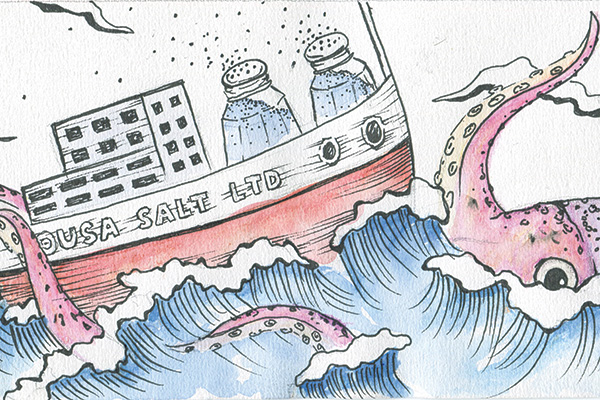Hernandez: “I Am Not A Bitch”
This Week’s News to Be Taken With Shipping Container Full of Salt
OUSA currently receives around three-quarters of its revenue through its Service Level Agreement (SLA) with the University, which places the University in a powerful bargaining position. As reported in last week’s Critic, senior OUSA figures believe the University may withdraw from SLA negotiations should OUSA purchase a bar without the University’s involvement.
University Vice-Chancellor Professor Harlene Hayne told Critic that the University’s “clear advice” to OUSA was not to purchase a pub. However, Hayne would not be drawn on whether the University had ever threatened to withdraw from SLA negotiations over the matter.
“My very clear advice to OUSA is that this is a really, really bad idea, and certainly they cannot use any of their SLA funding to engage in this business – not necessarily because it’s a pub, but because it’s a really bad business to get engaged in right now,” she said.
The University has also made it clear that it opposes any use of OUSA reserves, which total around $6 million, to purchase a bar. “My advice would be exactly the same, whether it’s the reserves or the SLA, it’s a bad business decision,” Hayne said.
Despite the University framing their position as “business advice,” figures within OUSA have interpreted this as a threat, and the Executive was advised not to proceed with any plan to purchase a bar while SLA negotiations were ongoing. This included Welfare Officer Ruby Sycamore-Smith’s proposal to raise $500,000 through PledgeMe to purchase a part-ownership in the pub. The proposal was tabled at the 3 September meeting, but was withdrawn pending consultation with the University. It was not re-tabled at the latest meeting on 10 September.
The debacle spilled over onto Facebook last Monday, when OUSA President Francisco Hernandez referred to Critic as “infotainment” and suggested that its articles be taken “with a shipping container full of salt.” He also took umbrage at Critic’s suggestion that OUSA had become the University’s bitch, clarifying that he was “not a bitch.”
Hernandez later apologised to Critic staff for his remarks, correctly identifying that Critic is “the best student magazine in the country.” In a Freudian slip, he also expressed his belief that Critic’s coverage of the issue was “factually correct.”
A portion of the student body has been pushing for OUSA to purchase a bar for some years now, in response to the gradual closure of most of North Dunedin’s iconic pubs. However, Hernandez insists that purchasing a bar is not “fiscally responsible,” and that OUSA lacks the infrastructure to take on the venture.
Despite this, OUSA and the University remain interested in co-owning a pub, possibly one on campus, although Hayne told Critic that “if the Cook wants to reopen we don’t want to go in competition with the Cook.” As reported in Critic last week, the Cook’s new owners plan to reopen the pub as a restaurant and bar within a year.
The University’s main objection, then, is to OUSA owning a bar without any University involvement. It is questionable whether the financial rationale is sufficient to explain such staunch opposition to the idea. The University of Canterbury Students’ Association (UCSA) has owned a bar on campus, the Foundry, since the 70s.
Although Hayne insists that the University’s opposition is not about alcohol, pointing out that “OUSA runs the best events involving alcohol in this entire city,” the University has a long-standing antagonism toward student drinking and last year backed proposals for a permanent North Dunedin-wide liquor ban. The proposed ban was only abandoned in April this year after OUSA collected over 5,000 signatures against it.
While there are undoubted financial barriers to owning a bar in North Dunedin, the saga raises wider concerns about OUSA’s independence from the University. Prior to 2012, OUSA was funded through compulsory membership fees. This gave OUSA complete discretion in its spending, subject only to its constitution. After the passage of Voluntary Student Membership (VSM), however, OUSA charges no membership fee and can only secure SLA funding through negotiation with the University.
This model provides more financial oversight of OUSA and prevents its financial decisions being hijacked. In the early 2000s, for instance, OUSA spent half a million dollars on its Aquatic Centre after the rowing club stacked a Student General Meeting and passed a motion to that effect. The centre cost OUSA $65,000 in maintenance costs this year alone.
On the other hand, the SLA gives the University unprecedented financial control over OUSA and prevents the association from spending as its members direct. OUSA is to seek student consultation on its proposed 2014 budget this week, but as this budget has already been the subject of protracted negotiations between OUSA and the University, radical changes are likely impossible.
The University was opposed to VSM when the legislation was introduced, and made a submission against Heather Roy’s Education (Freedom of Association) Amendment Bill in 2011. However, Hayne now states her position on VSM as “agnostic … I think that the VSM has provided much greater opportunities than it has challenges.
“In the event that [VSM] was repealed … we would find other opportunities to work collaboratively [with OUSA],” Hayne continued. “But from my perspective the VSM just does not appear on my radar on a daily basis, because I do think the relationship between OUSA in particular and the student body in general and the University is really good right now. And I just wouldn’t want to put that in jeopardy, for any reason.”







